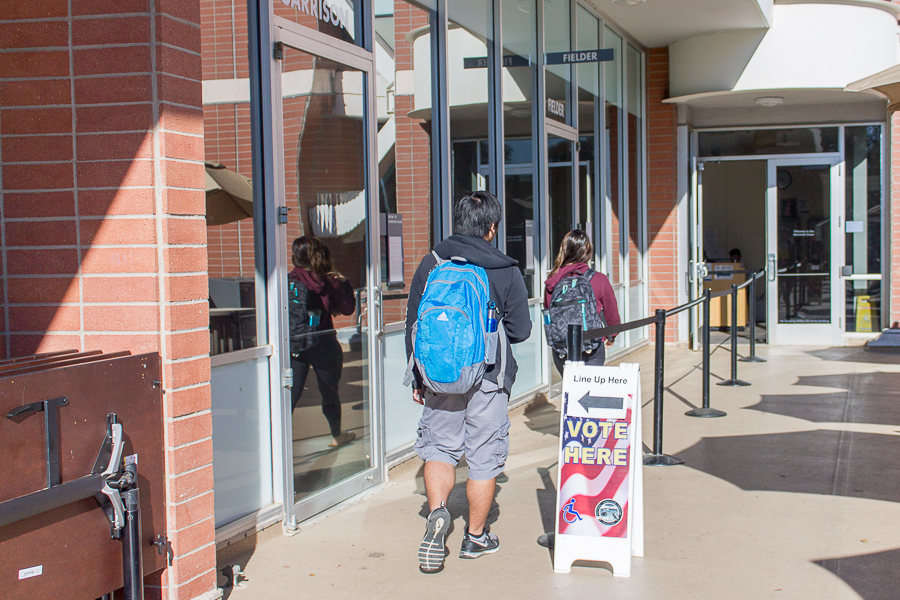
Election results are in; Davis community concerned for what the future holds
As Election Day came to a close, and the results trickled in, it proved a difficult time for many as Americans worried about the next president and the future of the country. As the night progressed, some people rejoiced at the results of this year’s election, while many heads hung in sorrow.
By the end of the night, the United States elected a Republican-controlled Senate, a Republican-controlled House of Representatives and a Republican-controlled White House. As residents in a progressive state, many Californians and UC Davis students felt shock and terror regarding the choices the nation had made.
While students and residents ran to the streets in protest of Donald J. Trump’s presidential victory on Nov. 8, Davis mayor Robb Davis extended his hand and listened to the concerns of many people downtown, who felt fearful and concerned about the safety of certain groups of people.
“This is a time that we as a city need to come together and say what it is we value in each other,” Davis said. “We need to make commitments to each other and discuss how we are going to deal with vulnerable populations, people who are legitimately experiencing fear. We need to decide how we are going to be as people to counter to exclusion and hate that has been so much part of the campaign.”
Irene Ezran, a third-year Spanish and International Relations major, supports students’ rights to protest against Trump’s presidency.
“Had the opposition been a respectful candidate, I wouldn’t have been in favor of protesting so much, and instead I would have encouraged moving forward as a country,” Ezran said. “Given the fact that Clinton won the popular vote, and Trump’s rhetoric is offensive to millions of Americans, particularly immigrants, Muslims, women and disabled people, as students we have the right and duty to show that we do not stand by his values of hatred and intolerance.”
While the headline of this election was the race for presidency between Hillary Clinton and Donald Trump, there were also many regional measures for Californians to vote on:
Prop. 51 (Passed): Allows California to sell up to $9 billion in bonds ($7 billion going toward K-12 schools and the remaining $2 billion for community colleges) for the construction and modernization of school facilities. This results in a cost of approximately $17.6 billion (initial cost of $9 billion in addition to $8.6 billion in interest).
Prop. 52 (Passed): Indefinitely extends an existing statute imposing fees on private hospitals to fund Medi-Cal, care for uninsured patients, children’s health coverage, and provide grants to public hospitals. This creates little fiscal impact on the state and taxpaying individuals.
Prop. 53 (Failed): If passed, it would have required statewide voter approval for revenue bonds to be issued or sold for any project costing over $2 billion if funded, owned, or managed by the state; however, this measure failed so state revenue bonds may continue to be provided without voter approval.
Prop. 54 (Passed): Any bill or amendments to a bill must be posted on the Internet for a minimum of 72 hours before the Legislature can pass it. In addition, the legislature must also record their proceedings and post it on the Internet for public viewing. The fiscal ramification of this proposition results in a one-time $1 to $2 million cost, in addition to an annual cost of about $1 million for video and recording.
Prop. 55 (Passed): Enacted in 2012 (until 2018), this measure extends the increased income tax on earnings over $250,000 until 2030. The allocated funds will support K-12 schools, community colleges, and healthcare. Results in an approximate $4 to $9 billion in annual state revenue from 2019 to 2030.
Prop. 56 (Passed): Increases the state excise tax on cigarettes by $2 per pack. The tax rises from 87 cents to $2.87 on cigarette packs with e-cigarettes and other tobacco products increasing in similar amounts. This tax will go towards funding health care for low-income Californians.
Prop. 57 (Passed): Allows certain state prison inmates parole consideration if convicted of nonviolent felony offenses. In addition, the prison system can award sentencing credit to inmates for good behavior, rehabilitation or education. Moreover, juveniles are required to appear in juvenile court before being transferred to adult court. This relieves the state of about tens of millions of dollars annually and produces net county costs of about a few million dollars annually.
Prop. 58 (Passed): Allows public schools to more easily choose how to teach English efficiently for non-native speakers, whether in English-only, in dual-language immersion or in other types of programs. It also continues to require that public schools ensure students are proficient in English. There is no notable fiscal impact on the state or schools.
Prop. 59 (Passed): As an advisory measure, this proposition does not require any action by state or federal legislature, but asks elected officials to overturn the Supreme Court’s decision in Citizens United v. Federal Election Commission. This case ruled that it was unconstitutional to place political spending limits on corporations and unions. This asks the legislature to increase regulation on campaign spending and contributions. This presents no direct cost to state or local governments.
Prop. 60 (Failed): If passed, this proposition would have required adult film performers to use condoms during the filming of sexual intercourse and requires producers to pay for vaccines, tests, and medical exams with additional ways of enforcing those requirements. Not passing this measure means that adult film productions would continue to be subject to state and local workplace health and safety requirements.
Prop. 61 (Failed): Passing this measure would have prohibited state agencies from paying more for prescription drugs than the lowest price paid for the drug by the United States Department of Veteran Affairs. Its failure allows state agencies to continue to negotiate prices of drugs without reference to the prices paid by the Department of Veteran Affairs.
Prop. 62 (Failed): Passage would have repealed the death penalty and replaced it with life imprisonment without the possibility of parole; however, its failure continues the death penalty sentence.
Prop. 63 (Passed): Initiates new requirements for selling or purchasing ammunition, including a background check and approval from the Department of Justice. It also prohibits possession of large-capacity magazines and calls for the creation of a new court process for the removal of firearms from prohibited persons after being convicted of certain crimes. This increases the court law enforcement costs of California and its local governments by potentially tens of millions of dollars annually.
Prop. 64 (Passed): Legalizes marijuana for recreational use, possession and cultivation by adults 21 and older, and imposes state taxes on the sale and cultivation of cannabis. It allows for regulation of non medical marijuana business by local governments and imposes standards for marijuana products. The revenue will fund youth programs, environmental protection, and law enforcement.
Prop. 65 (Failed): If passed, this would have redirected the money collected from the sale of carryout bags to environmental projects. Its failure imposes that charges on carryout bags could fund any purpose.
Prop. 66 (Passed): Changes court procedures for legal challenges to death sentence, including limiting successive petitions, increasing available attorneys for appeals and setting time limits on challenges. The fiscal impact of this measure in unknown.
Prop. 67 (Passed): This proposition prohibits most stores from providing single-use plastic carryout bags and instead requires a 10 cent charge for any other carryout bags. The estimated cost of this measure in unknown but relatively small.
Written By: Bianca Antunez — city@theaggie.org



